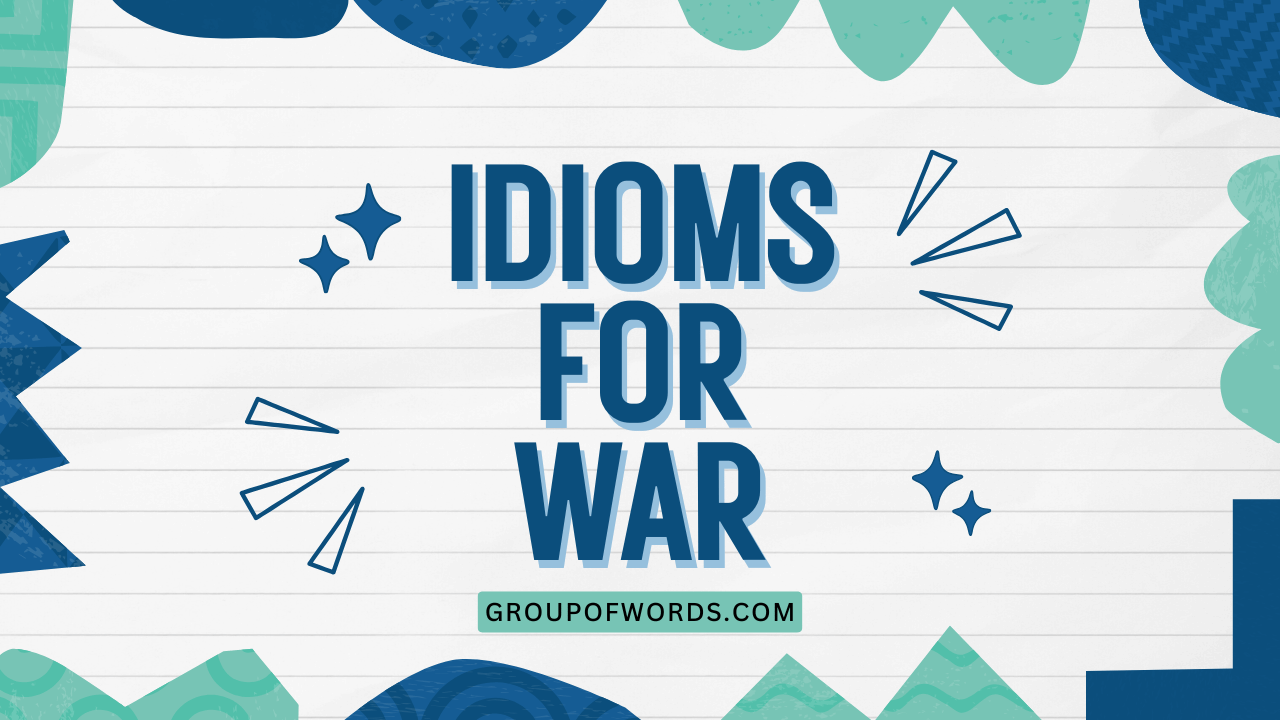Idioms for War: A Comprehensive Guide
Idioms are colorful expressions that add depth and nuance to the English language. Understanding idioms, especially those related to war, is crucial for grasping the subtleties of English communication, particularly in literature, news, and everyday conversation.
These idioms often carry historical and cultural weight, enriching our understanding of both language and history. This article provides a comprehensive overview of war-related idioms, their meanings, origins, and usage, benefiting English language learners, writers, and anyone interested in expanding their vocabulary and improving their comprehension of figurative language.
Table of Contents
- Introduction
- Definition of Idioms for War
- Structural Breakdown of War Idioms
- Types and Categories of War Idioms
- Examples of War Idioms
- Usage Rules for War Idioms
- Common Mistakes with War Idioms
- Practice Exercises
- Advanced Topics: Historical and Cultural Context
- FAQ
- Conclusion
Introduction
Idioms are more than just words; they are windows into a culture’s history, values, and ways of thinking. War idioms, in particular, offer a powerful lens through which to examine conflict, strategy, and the human cost of struggle.
Learning these idioms not only enhances your linguistic skills but also provides a deeper understanding of the contexts in which they are used. This article will equip you with the knowledge and tools to confidently recognize, interpret, and use war idioms in your own communication.
Definition of Idioms for War
An idiom is a phrase or expression whose meaning cannot be understood from the literal meanings of its individual words. Instead, it has a figurative meaning that is known through common usage.
Idioms related to war draw their imagery and metaphors from military conflicts, battles, and strategies to describe non-military situations. They are a type of figurative language that adds color, emphasis, and often a sense of drama to communication.
These idioms are used to describe various aspects of life, such as competition, negotiations, personal struggles, and even mundane tasks, by drawing parallels to the intensity and challenges of war.
Classification of War Idioms
War idioms can be classified based on the specific aspect of war they represent. Some focus on the overall concept of war and conflict, while others relate to specific elements like battles, strategies, or the consequences of war.
For example, “to fight a losing battle” refers to a hopeless struggle, while “to hold one’s ground” means to defend one’s position. Understanding these classifications helps in grasping the nuances of each idiom and using them appropriately.
Function of War Idioms
The primary function of war idioms is to convey complex ideas and emotions in a concise and impactful way. They add vividness and emotional weight to language, making it more engaging and memorable.
By using war idioms, speakers and writers can evoke a sense of urgency, determination, or even futility, depending on the context. These idioms also serve as cultural shorthand, allowing people to quickly understand and relate to shared experiences and emotions.
Contexts of War Idioms
War idioms are used in a wide range of contexts, from formal writing and speeches to informal conversations. They are particularly common in political discourse, business negotiations, sports commentary, and personal narratives.
The appropriateness of using a war idiom depends on the audience, the tone of the communication, and the specific message being conveyed. In some cases, using a war idiom can be seen as aggressive or insensitive, while in others, it can be an effective way to emphasize a point or create a dramatic effect.
Always consider the context and potential impact before using a war idiom.
Structural Breakdown of War Idioms
War idioms often follow specific grammatical structures, such as verb phrases, noun phrases, or prepositional phrases. Understanding these structures can help in recognizing and interpreting idioms more effectively.
For example, many war idioms involve verbs like “fight,” “attack,” or “defend,” followed by nouns or pronouns that represent the object of the action. Others use prepositions like “on,” “under,” or “in” to indicate location or condition.
Analyzing the structural elements of war idioms provides insights into their underlying logic and metaphorical meanings.
Here are some common structural patterns found in war idioms:
- Verb + Noun/Pronoun: fight a battle, win the war, lose ground
- Preposition + Noun: on the front lines, in the trenches, under siege
- Adjective + Noun: a war of attrition, a scorched-earth policy, a battle plan
Recognizing these patterns can help you identify and understand unfamiliar war idioms more easily. By paying attention to the grammatical structure, you can often infer the meaning of an idiom even if you have never encountered it before.
Types and Categories of War Idioms
War idioms can be categorized based on the specific aspects of war they represent. This classification helps in understanding the nuances of each idiom and using them appropriately.
Here are some common categories of war idioms:
- General War Idioms: These idioms refer to the overall concept of war and conflict.
- Battle Idioms: These idioms relate to specific battles and combat situations.
- Strategy Idioms: These idioms describe military strategies and tactics.
- Defeat Idioms: These idioms refer to losing a battle or war.
- Victory Idioms: These idioms describe winning a battle or war.
Understanding these categories can help you choose the most appropriate idiom for a given situation and avoid misusing them.
Examples of War Idioms
This section provides extensive examples of war idioms, organized by category. Each example is accompanied by a definition and a sample sentence to illustrate its usage.
General War Idioms
These idioms refer to the overall concept of war and conflict, often used to describe difficult or challenging situations.
Below is a table containing examples of general war idioms with their definitions and example sentences:
| Idiom | Definition | Example Sentence |
|---|---|---|
| A war of attrition | A conflict where each side tries to wear down the other through continuous losses. | The negotiations became a war of attrition, with neither side willing to concede. |
| Declare war on | To start a conflict or campaign against someone or something. | The government decided to declare war on poverty. |
| In the trenches | In the midst of a difficult or challenging situation. | We’re in the trenches right now trying to meet the deadline. |
| Casualty | Someone or something that suffers as a result of an event or situation. | The company restructuring resulted in several casualties. |
| Collateral damage | Unintended harm to civilians or non-combatants during a military operation; also used to describe unintended negative consequences. | The new policy, while intended to help, caused some collateral damage to small businesses. |
| Behind enemy lines | In a dangerous or hostile environment. | Trying to negotiate a peace treaty felt like being behind enemy lines. |
| Call a truce | To agree to stop fighting or arguing for a period of time. | After hours of arguing, they decided to call a truce and revisit the issue later. |
| A shot across the bow | A warning given to someone to stop doing something. | The lawsuit was a shot across the bow, warning them to cease their unfair practices. |
| Draw battle lines | To define opposing positions in a conflict or disagreement. | The debate over the new policy began to draw battle lines within the company. |
| Peace talks | Discussions aimed at ending a conflict or dispute. | Peace talks are scheduled to begin next week in hopes of resolving the conflict. |
| Fight a losing battle | To struggle against something that is impossible to win. | He was fighting a losing battle trying to save the failing company. |
| On the warpath | In a state of anger and ready to confront someone. | She was on the warpath after discovering the mistake. |
| Scorched-earth policy | A strategy of destroying everything that might be useful to the enemy; also used to describe a ruthless or destructive approach. | The company adopted a scorched-earth policy, cutting costs drastically to survive. |
| Tug of war | A situation where two opposing forces are pulling in different directions. | The project became a tug of war between different departments. |
| War games | Simulated military exercises; also used to describe strategic planning or scenario testing. | The company conducted war games to prepare for potential market disruptions. |
| War chest | Funds accumulated for a specific purpose, especially for political campaigns or business ventures. | The political party has built up a significant war chest for the upcoming election. |
| Fall on your sword | To take responsibility for a failure or mistake, often resulting in resignation or demotion. | The CEO decided to fall on his sword after the scandal. |
| Sound the alarm | To warn people about a danger or problem. | The report sounded the alarm about the rising debt levels. |
| Baptism of fire | A person’s first experience of something difficult or dangerous. | His first day on the job was a real baptism of fire. |
| No quarter given | No mercy shown. | In the negotiation, no quarter was given; both sides fought fiercely for every point. |
| Dig in your heels | To refuse to compromise or change your mind. | She dug in her heels and refused to back down on her demands. |
| Under fire | Being criticized or attacked. | The manager was under fire for his handling of the crisis. |
| A battleground | A place or situation where there is intense conflict or competition. | The education system has become a battleground for political ideologies. |
| On a knife edge | In a tense situation | The election was on a knife edge. |
Battle Idioms
These idioms relate to specific battles and combat situations, often used to describe intense competition or struggles.
Below is a table containing examples of battle idioms with their definitions and example sentences:
| Idiom | Definition | Example Sentence |
|---|---|---|
| Hold one’s ground | To defend one’s position or opinion. | Despite the criticism, she held her ground and defended her research. |
| A fighting chance | A small but real possibility of success. | With the new strategy, we have a fighting chance of winning the contract. |
| In the line of fire | In a position where one is likely to be criticized or attacked. | As the team leader, he was in the line of fire when the project failed. |
| Win the battle but lose the war | To achieve a short-term victory that ultimately leads to long-term defeat. | They won the battle but lost the war by cutting prices too low and damaging their brand. |
| Fight tooth and nail | To fight fiercely and with great determination. | They had to fight tooth and nail to get the funding for their project. |
| Go to war | To engage in a conflict or competition. | The two companies went to war over market share. |
| Lose ground | To lose advantage or progress. | The company began to lose ground to its competitors due to poor marketing. |
| Onslaught | A fierce or destructive attack. | The website faced an onslaught of negative comments after the announcement. |
| Under attack | Being criticized or challenged. | The politician was under attack for his controversial statements. |
| A flashpoint | A place or situation where conflict is likely to occur. | The border region is a flashpoint for tensions between the two countries. |
| Crossfire | A situation in which someone is caught between two opposing forces or arguments. | The mediator found himself in the crossfire of the dispute. |
| The gloves are off | The gloves are off – a situation in which someone stops being polite and starts fighting or arguing forcefully. | The gloves are off as the election campaign heats up. |
| Man the ramparts | Prepare to defend against an attack. | With the company facing a crisis, it’s time to man the ramparts and protect our interests. |
| Join battle | To start fighting | The two sides joined battle over the new regulations. |
| Take a beating | To suffer a heavy defeat or loss. | The stock market took a beating after the economic report was released. |
Strategy Idioms
These idioms describe military strategies and tactics, often used to describe planning and decision-making in various contexts.
Below is a table containing examples of strategy idioms with their definitions and example sentences:
| Idiom | Definition | Example Sentence |
|---|---|---|
| Cover all the bases | To take all necessary precautions. | We need to cover all the bases before launching the new product. |
| A strategic retreat | A planned withdrawal to a more favorable position. | The company made a strategic retreat from the market to regroup and re-strategize. |
| The upper hand | An advantage over someone else. | Having more experience gave him the upper hand in the negotiation. |
| Game plan | A strategy or plan for achieving a goal. | The coach outlined the game plan for the upcoming match. |
| Ahead of the game | Having an advantage or being more prepared than others. | Investing in new technology has kept the company ahead of the game. |
| Play your cards right | To act wisely and strategically to achieve a desired outcome. | If you play your cards right, you could get a promotion. |
| Take the high ground | To adopt a morally superior position. | She decided to take the high ground and refuse to engage in the gossip. |
| Plan of attack | A detailed strategy for achieving a goal. | The team developed a plan of attack to address the project’s challenges. |
| Close ranks | To come together to defend against a threat or attack. | The team decided to close ranks after the negative publicity. |
| Call the shots | To be in control and make the decisions. | As the CEO, she calls the shots in the company. |
Defeat Idioms
These idioms refer to losing a battle or war, often used to describe setbacks or failures.
Below is a table containing examples of defeat idioms with their definitions and example sentences:
| Idiom | Definition | Example Sentence |
|---|---|---|
| Raise the white flag | To surrender or admit defeat. | After months of struggling, the company had to raise the white flag and file for bankruptcy. |
| Down for the count | Defeated or unable to continue. | The boxer was down for the count after the knockout punch. |
| Bite the dust | To be defeated or killed. | Many small businesses bit the dust during the economic downturn. |
| Throw in the towel | To give up or quit. | He decided to throw in the towel after years of unsuccessful attempts. |
| Loser in the battle | To be defeated | They were the loser in the battle of the streaming services. |
Victory Idioms
These idioms describe winning a battle or war, often used to describe successes or achievements.
Below is a table containing examples of victory idioms with their definitions and example sentences:
| Idiom | Definition | Example Sentence |
|---|---|---|
| Win the day | To be victorious or successful. | The team won the day with their innovative presentation. |
| Come out on top | To be successful or victorious after a struggle. | Despite the challenges, they came out on top and achieved their goals. |
| Triumph over adversity | To overcome difficult circumstances and achieve success. | The athlete triumphed over adversity to win the gold medal. |
| Claim victory | To declare that you have won a fight or competition. | The candidate claimed victory in the election after the votes were counted. |
| Seize the day | Make the most of the present moment. | They seized the day. |
Usage Rules for War Idioms
Using war idioms correctly requires an understanding of their specific meanings and contexts. While they can add color and emphasis to your language, they can also be misused or misinterpreted if not used carefully.
Here are some general rules to follow when using war idioms:
- Understand the meaning: Make sure you fully understand the meaning of the idiom before using it. Look it up in a dictionary or idiom guide if you are unsure.
- Consider the context: Think about the context in which you are using the idiom. Is it appropriate for the audience and the tone of the communication?
- Avoid overuse: Using too many idioms can make your language sound unnatural or forced. Use them sparingly and only when they add value to your message.
- Be aware of cultural differences: Some idioms may not be universally understood or may have different meanings in different cultures. Be mindful of your audience’s background.
Additionally, pay attention to the grammatical structure of the idiom. Make sure you are using the correct verb tense, noun form, and prepositional phrases.
Incorrect grammar can change the meaning of the idiom or make it sound awkward.
Common Mistakes with War Idioms
One common mistake is misinterpreting the meaning of war idioms. For example, confusing “a war of attrition” with a quick battle, or using “collateral damage” to describe intentional harm.
Another frequent error is using the idioms in inappropriate contexts, such as using “on the warpath” in a friendly conversation. Here are some examples of common mistakes and their corrections:
| Incorrect | Correct | Explanation |
|---|---|---|
| “He declared war to his friend.” | “He declared war on his friend.” | The correct preposition is “on,” not “to.” |
| “She was in the trenches with happiness.” | “She was in the trenches trying to meet the deadline.” | “In the trenches” implies a difficult situation, not happiness. |
| “They raised the white flag of victory.” | “They raised the white flag.” (implying surrender) | The white flag signifies surrender, not victory. |
| “The company is fighting a winning battle.” | “The company is fighting a tough battle.” or “The company is winning the battle.” | “Fighting a battle” means it is already a hard one |
Practice Exercises
Test your understanding of war idioms with these practice exercises. Choose the correct idiom to complete each sentence.
Exercise 1: Fill in the Blanks
Fill in the blanks with the appropriate war idiom from the list below:
(on the warpath, a war of attrition, hold their ground, in the trenches, throw in the towel)
- After months of negotiations, it became __________, with neither side willing to concede.
- Despite the pressure, the team managed to __________ and defend their position.
- The manager was __________ after discovering the accounting error.
- We’re __________ trying to finish the project before the deadline.
- After years of struggling, he decided to __________ and pursue a different career.
Answer Key:
- a war of attrition
- hold their ground
- on the warpath
- in the trenches
- throw in the towel
Exercise 2: Multiple Choice
Choose the best definition for the following war idioms:
- “Cover all the bases” means:
- To ignore important details.
- To take all necessary precautions.
- To attack from all directions.
- “Win the battle but lose the war” means:
- To achieve a short-term victory that leads to long-term defeat.
- To lose a minor battle but win the overall war.
- To avoid conflict at all costs.
- “Raise the white flag” means:
- To celebrate victory.
- To surrender or admit defeat.
- To declare war.
- “Game plan” means:
- A strategy or plan for achieving a goal.
- A competition with complex rules.
- A series of random events.
- “To come out on top” means:
- To be unsuccessful.
- To be successful or victorious after a struggle.
- To avoid competition.
Answer Key:
- b
- a
- b
- a
- b
Exercise 3: Sentence Completion
Complete the following sentences using appropriate war idioms:
- The company adopted a __________ policy, cutting costs drastically to survive.
- The debate over the new policy began to __________ within the company.
- The CEO decided to __________ after the scandal.
- The politician was __________ for his controversial statements.
- The company made __________ from the market to regroup and re-strategize.
Answer Key:
- scorched-earth
- draw battle lines
- fall on his sword
- under attack
- a strategic retreat
Advanced Topics: Historical and Cultural Context
The meanings and connotations of war idioms are often rooted in historical and cultural contexts. For example, the idiom “in the trenches” evokes the harsh conditions of trench warfare during World War I.
Understanding these historical roots can add depth to your understanding of the idioms and their usage. Similarly, cultural values and beliefs about war and conflict can influence the way these idioms are interpreted and used in different societies.
Exploring the historical and cultural dimensions of war idioms can provide valuable insights into the evolution of language and culture.
For instance, the idiom “crossing the Rubicon” (meaning to pass a point of no return) originates from Julius Caesar’s defiance of the Roman Senate when he crossed the Rubicon River with his army, effectively starting a civil war. Understanding this historical context adds significant weight to the idiom’s meaning.
FAQ
- What is the difference between an idiom and a metaphor?
An idiom is a phrase with a figurative meaning that is different from the literal meaning of its individual words. A metaphor is a figure of speech that directly compares two unrelated things. While some idioms may contain metaphors, not all metaphors are idioms. Idioms are fixed expressions, while metaphors can be more flexible and creative.
- How can I improve my understanding of idioms?
The best way to improve your understanding of idioms is to read and listen to English as much as possible. Pay attention to how idioms are used in context and look up any unfamiliar idioms in a dictionary or idiom guide. Practice using idioms in your own writing and speaking.
- Are war idioms appropriate for all situations?
No, war idioms are not appropriate for all situations. Consider the audience, the tone of the communication, and the specific message you are trying to convey. In some cases, using a war idiom can be seen as aggressive or insensitive. Use them judiciously and only when they add value to your message.
- Can idioms be translated literally?
No, idioms cannot be translated literally. The literal translation of an idiom will often make no sense or have a completely different meaning. It is important to understand the figurative meaning of the idiom and find an equivalent expression in the target language.
- How do I know when to use an idiom?
Use idioms when you want to add color, emphasis, or emotional weight to your language. They can make your communication more engaging and memorable. However, avoid overuse and make sure the idiom is appropriate for the context and audience.
- Are there any resources for learning more about idioms?
Yes, there are many resources available for learning more about idioms, including dictionaries, idiom guides, websites, and language learning apps. Some popular resources include the Oxford Dictionary of Idioms, the Cambridge International Dictionary of Idioms, and online idiom quizzes and exercises.
- Why are war idioms so common in everyday language?
War idioms are prevalent because they provide a powerful and relatable way to describe conflict, competition, and struggle. The imagery of war is easily understood and evokes strong emotions, making these idioms effective for conveying complex ideas and emotions.
- How can I avoid misusing war idioms?
To avoid misusing war idioms, always double-check their meaning and usage in a reliable dictionary or idiom guide. Pay attention to the context and audience, and be mindful of cultural differences. Practice using idioms in your own communication and ask for feedback from native English speakers.
Conclusion
Mastering idioms for war enhances your understanding of English language and culture. These idioms, steeped in historical context and cultural significance, add depth and color to communication, making it more engaging and impactful.
By understanding the definitions, usage rules, and common mistakes associated with these idioms, you can confidently incorporate them into your vocabulary. Continued practice and exposure to authentic English content will further refine your skills, allowing you to appreciate and utilize the richness of the English language.






